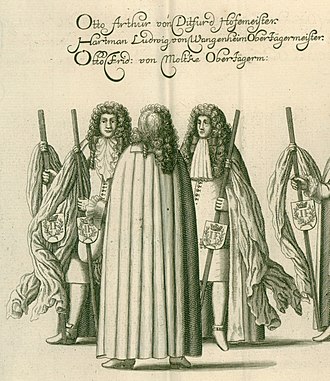Hartmann Ludwig von Wangenheim

1680 at the funeral procession for Duke Johann Friedrich von Braunschweig-Lüneburg ; Copper engraving (detail) by Johann Georg Lange on the initiative of Gottfried Wilhelm Leibniz
Hartmann Ludwig von Wangenheim (born September 29, 1633 in Thuringia ; † December 30, 1718 ) was a German court official and chief forestry and hunter master in Hanover .
Life
Hartmann Ludwig von Wangenheim came from the Thuringian noble family von Wangenheim and was born in Thuringia during the Thirty Years War in 1633 as the son of the hunter Hans Dietrich von Wangenheim († before 1697).
Von Wangenheim, who took Anna Magdalena von Reden from the Franzburg family as his wife, became the father of his daughter Anna Sibylla von Wangenheim (born September 29, 1651; † 1642 in Norten) at the age of twelve, and Ludwig became the second wife in 1665 von Dörberg (* 1629 - † February 22, 1696) married. Of von Wangenheim's sons, the eldest, August Wilhelm von Wangenheim (1697–1764), was the successor to the von Wangenheimschen estates in Waake and Oberhofmarschall in Hanover. The younger Georg August von Wangenheim rose to become general of the infantry.
Von Wangenheim initially served the Duke Ernst August von Braunschweig-Lüneburg and moved in his entourage in 1679 from the court of Osnabrück to Hanover. As head forest and hunter master, he started the duck catch for his sovereign northwest of the city of Hanover and far away from the former village of Herrenhausen in order to be able to regularly supply the court kitchen with ducks.
In search of cheap property of his own, von Wangenheim first acquired the free Meierhöfe from Christoph Georg von Bonn in Waake from 1699 . However, as a result of the pursuit of a political career at the Hanover court, the estate was temporarily leased or managed by administrators.
Wangenheim's father, his wife, and the chief forest and hunter himself provided topics for the correspondence between the Hanoverian court advisor and polymath Gottfried Wilhelm Leibniz and the elector Sophie, and thus became part of the UNESCO world heritage .
Hartmann Ludwig von Wangenheim wanted - like his son and successor - to be buried on his country estate in Waake.
Archival material
Archives by and about Hartmann Ludwig von Wangenheim can be found, for example
- in the Lower Saxony State Archives (NLA) - Hanover location as an estate with the summary of hunting justice in the Bokeloh office , complaint by Ernst von Rontzier about the custodian of Calenberg for the period 1682–1713, made accessible by a finding aid
Web links
Individual evidence
- ↑ a b c d e Roswitha Jacobsen (arrangement), Juliane Brandsch (collaborator): Friedrich I. von Sachsen-Gotha-Altenburg (= publications from Thuringian state archives , volume 4), volume 3: Diaries 1667 - 1686 , Weimar: Böhlau, 2003, ISBN 978-3-7400-1033-1 and ISBN 3-7400-1033-9 , p. 109 and others; limited preview in Google Book search
- ↑ a b c d e f Michaela Fenske : A village in unrest. Waake in the 18th century (= Hannoversche Schriften zur Regional- und Lokalgeschichte , Volume 13), Bielefeld: Verlag für Regionalgeschichte, 1999, ISBN 978-3-89534-246-2 and ISBN 3-89534-246-7 , p. 33 , 41, 42; limited preview in Google Book search
- ↑ Information on VD17 , the directory of the 17th century prints published in German-speaking countries
- ↑ a b c Ernst Heinrich Kneschke : German count houses of the present. In heraldic, historical and genealogical relation , Volume 3: AZ , Leipzig: TO Weigel, 1854; Digitized via Google books
- ↑ a b c d Wenchao Li (ed.), Gerda Utermöhlen, Sabine Sellschopp (transl.): Gottfried Wilhelm Leibniz, Electress Sophie von Hannover. Correspondence , 1st edition, Göttingen: Wallstein Verlag, 2017, ISBN 978-3-8353-1884-7 and ISBN 3-8353-1884-5 , pp. 92, 134, 144, 870; limited preview in Google Book search
- ↑ Joachim Lampe: v. Wangenheim, August Wilhelm , in the other: Aristocracy, court nobility and state patriciate in Kurhannover. The spheres of life of the higher officials at the Electoral Hanoverian central and court authorities 1714 - 1760 (= Publications of the Historical Commission for Lower Saxony and Bremen , Volume 24) (= Studies on the history of the estates of Lower Saxony , Volume 2), Volume 2: Lists of officials and ancestors , Göttingen: Vandenhoeck & Ruprecht, 1963, p. 58; limited preview in Google Book search
- ↑ Waldemar R. Röhrbein : Entenfang , in: Stadtlexikon Hannover , p. 161
- ↑ Information from the estate database of the Federal Archives
| personal data | |
|---|---|
| SURNAME | Wangenheim, Hartmann Ludwig von |
| BRIEF DESCRIPTION | German court official and chief forestry and hunter master in Hanover |
| DATE OF BIRTH | September 29, 1633 |
| PLACE OF BIRTH | Thuringia |
| DATE OF DEATH | December 30, 1718 |